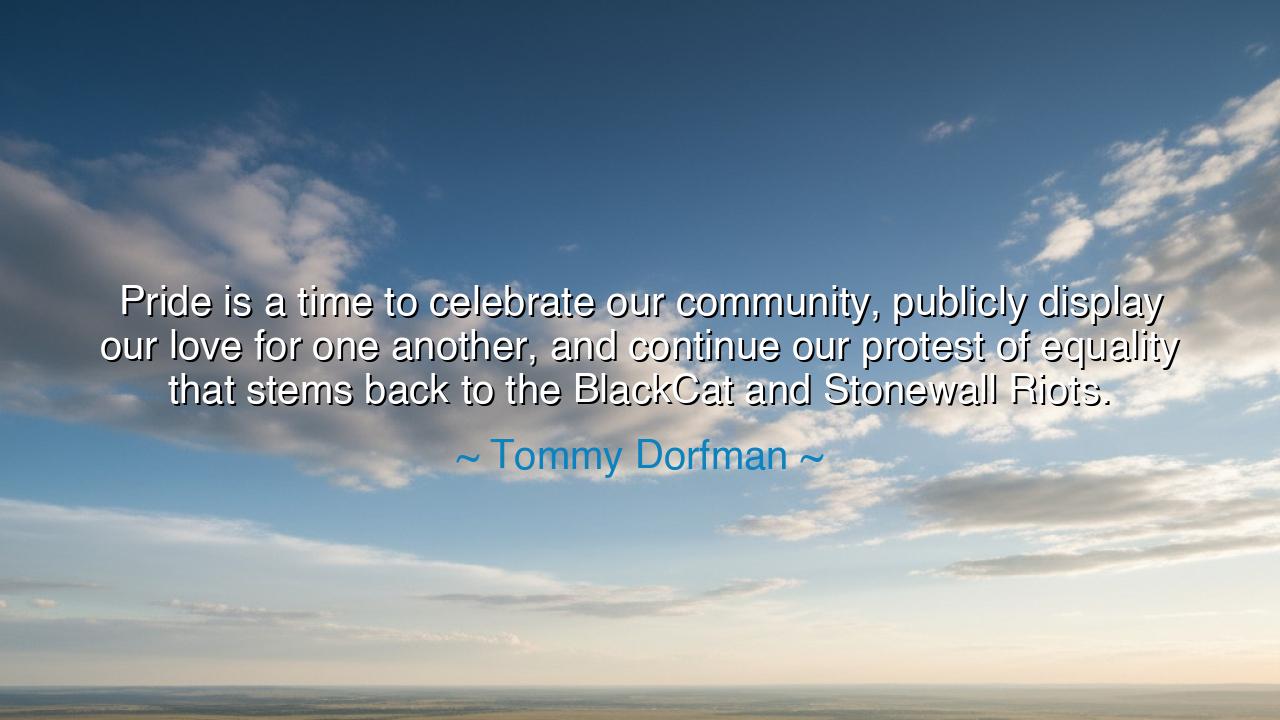
Pride is a time to celebrate our community, publicly display our
Pride is a time to celebrate our community, publicly display our love for one another, and continue our protest of equality that stems back to the BlackCat and Stonewall Riots.






O children of the future, gather close and listen to the words of Tommy Dorfman, who speaks of the deep significance of Pride—a time of celebration, love, and protest. He said, "Pride is a time to celebrate our community, publicly display our love for one another, and continue our protest of equality that stems back to the Black Cat and Stonewall Riots." These words resonate through the ages, calling us to remember the struggles and triumphs of those who came before us, whose courage paved the way for the freedom and equality that we now seek. Pride is not just a celebration of what we have achieved; it is a reminder of what we are still fighting for—a world where all people are accepted, loved, and treated equally.
In the ancient world, there were those who stood against the tides of oppression, even when their voices were barely heard. The Greeks were among the first to explore the nature of identity and love, but even in their society, many individuals were silenced by the prevailing norms. The Spartans, known for their military prowess, embraced same-sex bonds, but their world was built upon strict codes of conduct that left little room for the expression of love outside the rigid confines of family and state. The Romans, too, had their own view of love and relationships, with the powerful paterfamilias holding sway over the lives of those within his family. Despite the acceptance of certain expressions of same-sex love, those who lived outside of societal expectations were often marginalized, and their voices went unheard.
It was not until much later, during the Black Cat and Stonewall Riots of the 1960s and 1970s, that the world saw the eruption of a movement that called for the equality and recognition of all people, regardless of their sexual orientation. The Black Cat Tavern in Los Angeles was the site of one of the first major protests for the rights of the LGBTQ+ community in 1967, a full two years before the more famous Stonewall Riots in New York. The riots, which erupted in June 1969, were sparked by a police raid on the Stonewall Inn, a gathering place for the gay community. What followed was a night of rebellion—an outcry against the constant harassment and discrimination faced by the LGBTQ+ community. The Stonewall Riots marked the beginning of a new era in the fight for equality, one that would lead to the formation of pride parades, the rise of activism, and the ongoing push for rights that continue to this day.
Tommy Dorfman’s words remind us that Pride is not just a celebration, but a protest—a continuation of the struggle that began with these historic riots. The Stonewall Riots were not just a moment of rebellion; they were the beginning of a movement that has continued for decades. Each year, as people gather to celebrate Pride, they honor the bravery of those who fought before them and stand in solidarity with those still fighting for equality. Just as the ancients knew the importance of standing for what is right, so too do we now stand for the rights of those whose voices have been silenced for far too long.
The lesson Dorfman imparts is one of resilience and remembrance. Pride is a time to reflect on how far we have come, but it is also a time to recognize how much work remains. The struggle for equality is far from over, and each Pride celebration is both a commemoration of past victories and a reminder that the fight continues. It is a moment to honor the community that has grown and thrived in the face of adversity, but also a time to protest the inequalities that still exist. Pride is a declaration that we will not forget those who fought for the rights we have today, and that we will continue to push for a world where love and equality are not just ideals, but lived realities for all people.
Let us take inspiration from the heroes of the Stonewall Riots, who, though facing great risk, stood tall in their demand for respect, dignity, and justice. Their courage reminds us that change does not come from silence or complacency, but from action and visibility. Pride is the expression of love and community, but it is also the voice of protest, the call for equality that must continue to ring out until the world is just and fair for everyone, regardless of who they love or how they identify.
So, children, as you walk the path of life, remember that Pride is not just a celebration of identity, but a reminder of the struggle for justice that continues to this day. Stand with the LGBTQ+ community in solidarity, support their fight for equality, and honor the legacy of those who came before you. Just as the ancients fought for their freedom and dignity, so must you fight for the freedom and dignity of others. And may your voice rise in protest and celebration, for both are necessary to create a world where love is equal for all.






AAdministratorAdministrator
Welcome, honored guests. Please leave a comment, we will respond soon